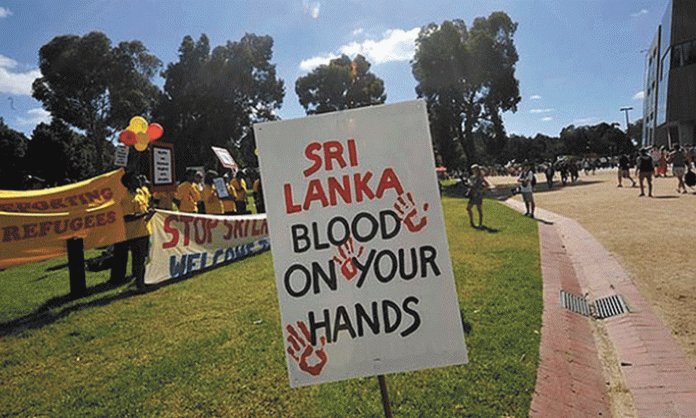The government routinely refers to refugees as “illegals” or “unauthorised arrivals”. They are human beings. In Australia’s concentration camps they are brutalised and scarred. The major parties want them disappeared. But they have friends, families and histories. In this series, Red Flag listens to the stories that governments want silenced.
----------
For someone who witnessed as a child the bloody horror of war, Aran Mylvaganam speaks with remarkable composure about his past. That’s true whether in private or in public – as is frequently the case due to his role as an advocate with the Tamil Refugee Council.
Aran was born five months after “Black July” in 1983, when anti-Tamil pogroms and riots erupted across Sri Lanka. Mobs of Sinhalese burned, looted and killed in broad daylight. According to some estimates, up to 3,000 Tamils were murdered, 8,000 homes and 5,000 shops were destroyed, and 150,000 people were made homeless.
The civil war between the government and the Liberation Tigers of Tamil Eelam – the northern and eastern regions of Sri Lanka – had begun.
Aran grew up in a coastal fishing village in Tamil Eelam. When he was 11 years old, the Sri Lankan air force bombed the Church of Saint Peter and Saint Paul in Navali, just north of Jaffna. “The Navali bombing was something that happened at a time when I could see all the injustices; I could understand it”, he says.
The Sri Lankan military had a reputation for targeting civilians. “They would come in helicopters and drop leaflets saying ‘Hide under the churches and schools whenever there is an attack nearby because we will not be targeting schools, churches, temples and hospitals’.”
Not long after Navali, Aran’s school was bombed. “When I ran out of the school, the first thing that I did was hide in a massive tamarind tree, which most of the kids were hiding under. My house is not far from the tree, it’s directly opposite, and my mum was calling our names – all the kids’ names – and so I ran to her. At that point they bombed the tree. Tens of Tamil school kids were killed.
“I still hold horrible images of my schoolmates being killed that day. My brother was killed that day also, as well as three of my cousins. One was six years old. We found her in pieces.”
After the army bombed the village fish market, Aran’s family joined hundreds of thousands of internally displaced Tamils. After surviving on the run and living in a refugee camp for a year, Aran’s uncle sent him abroad.
“So many kids died on the way to European countries. Sometimes they take them in ship containers. They hide them where they can’t breathe and they suffocate. Despite knowing that so many had died on the way, I still chose to get out of that country.”
But on arrival in Australia in 1997 he was detained and sent to Villawood detention centre. “It was heaven compared to what I had gone through. But looking back now, why did the Australian government detain a 13-year-old boy who had gone through so much? I mean, is that necessary? Do you have to torture people who have already been tortured?”
The incarceration lasted almost three months. It is testament to the appalling cruelty of Australia’s current internment regime that being imprisoned for several months in suburban Sydney would now be considered “favourable treatment”.
Despite this history, it is the present and the future that Aran is occupied with. His volunteer work with the Tamil Refugee Council now includes organising rallies and appearing on radio to defend the rights of other asylum seekers who are being mistreated by the government.
He also helps behind the scenes to create support networks for those who have been released from detention but thrown into the community with few rights and even fewer possessions.
As we talk about the past, he is preparing for a demonstration against the indefinite detention, due to secret ASIO assessments, of 46 refugees. The majority are Tamil, and have fled the genocide still being carried out by the Rajapaksa regime in Sri Lanka.
“My fear for my life ended in 1997. I still fought against the sufferings that I went through during the war and through my detention, but I overcame that and I want to ensure that no others go through what I went through. Or at least, that those who do go through it are welcomed rather than treated like the way I was treated.”
[For more information on the campaign against the Rajapaksa regime and to free Tamil refugees in Australia, visit facebook.com/tamilrefugeecouncil.]








